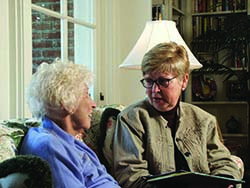
Home Care and the End of Life Process
Those who are facing chronic illness or life threatening disease often need care within their home. This allows them to recover in peace, without the invasive nature of a clinical setting. Home health situations provide you with a skilled team that can ease the transition from a hospital stay to independently managing care on your own, whether you are:
- Recovering from illness, injury or surgery
- Managing chronic disease
- Dealing with life-threatening conditions
In home health, the goal is to help patients improve their physical well-being, become as independent as they can be, and enjoy the best quality of life possible. Not all patients who opt for home health are terminal. Many are facing that diagnosis in the near future but haven’t yet been officially qualified for hospice care. This is a directive that can only come from a doctor who feels the patient has six months or less to live. Many people, unfortunately, are caught in that limbo space between knowing they have a terminal illness but still have at least six months or more to go in their lives. Home care is still an option, and it’s a good one.
Difference Between Palliative Care and Hospice Care
There is a slight but significant difference between these two types of care. Palliative care is a field of medicine that helps improve the quality-of-life for the patient by treating symptoms such a pain, nausea or sleep difficulties, says WebMD. It can also be used as a tool to help you and your family members better understand your illness, decide the kinds of treatments you want and do not want, and help you communicate better with your team of home health care professionals such as doctors, nurses and therapists. Pain and symptom control are at the center of palliative care, as well as treatment for the underlying disease. You don’t have to be considered near death to receive palliative care.
According to Medscape, palliative care accompanies the patient throughout their journey, from diagnosis and hope for cure, to hospice and hope for care.
Hospice care is indeed a type of palliative care that focuses on the comfort and pain management of the patient, but without the treatment aspect of curing the underlying disease. Hospice is considered end of life care, generally when the patient has less than six months to live. When this switch from standard home health care to hospice care (even if the patient remains in his or her home), the focus shifts from treatment to maintenance of comfort.
Coping with a Diagnosis
A big hurdle many people feel when they choose home health care for a terminal illness is coming to grips with the diagnosis itself. Home health care professionals such as nurses, therapists and counselors can help ease that transition. The American Psychological Association says emotional distress is common after receiving a chronic disease diagnosis, particularly for those who have a history of depression. You or your loved one may react in any number of ways. You may experience guilt, as in the case of diabetes or cancer related to smoking. You may also go through various stages of grief, denial, anger, sadness and even bargaining.
Every day can be a roller coaster ride of sorts. For that, you need someone to lean on. This isn’t always who you would expect: your close family and friends who come to visit. Often times, patients feel as though they don’t want to burden their loved ones with their emotional distresses, instead preferring to speak to someone outside their social circle That person is often their occupational or physical therapist, a counselor or their nurse. A social worker, for instance, can offer short-term counseling, and give advice on resource planning and long-term care arrangements.
The Home Care Team
The end of life process is never an easy one to navigate. But with the right team on your side, it can be bearable. At the start of home care, you will be assigned a team, with clearly defined roles. Team members work together to determine what each patient and family needs in order to best cope with treatment, as they design and coordinate a personal plan for care, says the American Cancer Society. It depends on the individual’s illness and needs, but generally, you can expect the home health care team to be made up of:
- Nurse: Evaluates the patient, offers hands-on care, and educates them about their condition, treatment, and pain management.
- A physical therapist, occupational therapist and/or speech pathologist: Work with patient as part of a coordinated rehabilitation plan based on the patient’s unique needs and personal goals.
- A home health aide: Assists with personal care such as bathing and dressing.
- A social worker: Offers short-term counseling.
- A dietitian: Addresses the patient’s nutritional needs and provides advice on healthy meals in compliance with any cultural and dietary restrictions.
Call Pathways Home Health Hospice Today
If you or a loved one is in need of home health care, contact us today at 888-755-7855. Here at Pathways Home Health Hospice, our goal is to help our patients improve their physical well-being, become as independent as they can be, and enjoy the best quality of life possible through pain management as part of the end of life process.

